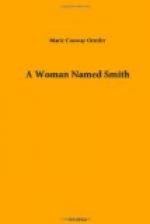“You are to understand that it was the unwritten law of the Hyndses’ that this house should come to the eldest son. Primogeniture is of course foreign to American ideas, but this is an old house, Miss Smith. When it was built, American ideas hadn’t been born. And the Hyndses were a law to themselves.
“The then head of the house was James Hampden Hynds, a man of an immense pride, a rigid sense of duty, and the nicest notions of honor. He had two sons, Richard, and the younger brother, Freeman. The daughters do not count: it is with these two sons we are concerned.
“From every account Freeman Hynds was a good man, a quiet, God-fearing, methodical man, attentive to his affairs, and meticulously exact in all his dealings; not warm-hearted, perhaps, but just. But as if the bad blood of the entire family had come to a head in one man, Richard was born a roisterer and a spendthrift.
“He grew up a magnificent young scapegrace, reckless to the point of madness, and with that inherent love of risk that is the very breath of life to such men. Despite these defects there is no doubt that his was one of those personalities that win love without effort. So of course it was a foregone conclusion that he should win the girl that his younger brother, among others, adored to distraction.
“His family hoped that his love for his young wife would change him for the better. But there was something tamelessly wild in Richard Hynds. He would have done very well, very well indeed, in the Golden Hind with Drake, or in the Jesus with Morgan. He did not fit in a gentler generation, and a mild life had no charm for him. Gossip buzzed with his name, even in a day when gentlemen were permitted to behave pretty much as they pleased.
“Up to this time there had never been anything altogether unpardonable charged against him. But one fine morning the Hynds jewels were missing. Remember that the Hyndses had always been a wealthy and powerful family. The theft of those jewels was no trumpery affair. For generations they had been adding to that collection—sometimes a lustrous pearl, sometimes a flawless emerald; once it was a sapphire that had belonged to a French queen, once a pair of rubies that had hung in the ears of a duchess beloved of King Charles.
“Richard’s mother happened to be a meek and quiet body, deeply religious, something of a Quakeress, so she wore them but seldom. It was upon the occasion of a ball to be given in honor of Freeman’s twenty-first birthday that the question of what jewels his mother should wear came up, and the strong-box in which they were kept was opened. Only the settings remained.
“When the clamor quieted and sane questions began to be asked, suspicion fastened upon Richard Hynds. His affairs were chaotic, his needs imperative and desperate. He had been heard to ask his mother if she intended wearing what he called ‘the Hynds fortune’ at Freeman’s ball. He knew, of course, where they were kept—in the anteroom of his mother’s apartment. It was not only possible but easy for him to gain access to them.




